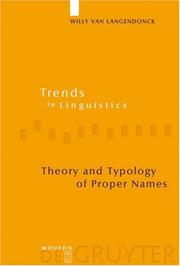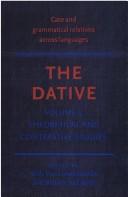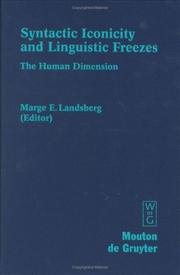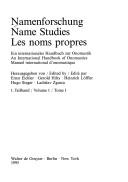| Listing 1 - 10 of 10 |
Sort by
|

ISBN: 1282194216 9786612194214 3110197855 9783110197853 9783110190861 3110190869 Year: 2007 Publisher: Berlin ; New York : Mouton de Gruyter,
Abstract | Keywords | Export | Availability | Bookmark
 Loading...
Loading...Choose an application
- Reference Manager
- EndNote
- RefWorks (Direct export to RefWorks)
This book proposes a new synthesis of the functions of proper names, from a semantic, pragmatic and syntactic perspective. Proper names are approached constructionally, distinguishing prototypical uses from more marked ones such as those in which names are used as common nouns. Since what is traditionally regarded as 'the' class of names turns out to be only one possible function of name-forms (though a prototypical one), the notion of 'proprial lemma' is introduced as the concept behind both proprial and appellative uses of such categories as place names and personal names. New formal arguments are adduced to distinguish proper name function from common noun or pronoun function. The special status of proper names is captured in a unified pragmatic-semantic-syntactic theory: a proper name denotes a unique entity at the level of langue to make it psychosocially salient within a given basic level category. The meaning of the name, if any, does not determine its denotation. An important formal reflection of this characterization of names is their ability to appear in such close appositional constructions as the poet Burns or Fido the dog. The neurolinguistic finding that proper names constitute a separate category is introduced and interpreted within a general linguistic frame of reference. The different kinds of meanings associated with names (categorical, associative, emotive, and grammatical) are shown to be presuppositional in nature. In addition, the book proposes an entirely new classification of proper names as forming a continuum ranging from prototypical (personal and place names) to nonprototypical categories (brand and language names) to citations and autonyms, and a new diachronic classification of family names and nicknames. This book fills an important gap in the current literature, because the most recent linguistic book in English on name theory dates back to 1973. It is explicitly interdisciplinary, taking into account linguistic, philosophical, neurolinguistic, sociolinguistic and dialect geographical aspects of proper names.
Names. --- Semantics. --- Pragmatics. --- Grammar, Comparative and general --- Typology (Linguistics) --- Language and languages --- Linguistic typology --- Linguistics --- Linguistic universals --- Syntax --- Pragmalinguistics --- General semantics --- Logic, Symbolic and mathematical --- Semantics (Philosophy) --- Formal semantics --- Semasiology --- Semiology (Semantics) --- Comparative linguistics --- Information theory --- Lexicology --- Meaning (Psychology) --- Nomenclature --- Proper names --- Terminology --- Epithets --- Syntax. --- Typology --- Classification --- Philosophy --- Etymology --- Philology --- Names --- Semantics --- Pragmatics --- Grammar, Comparative and general - Syntax --- Grammar, Comparative and general Syntax --- Onomastics. --- Typology (language).
Book
Year: 1971 Publisher: International Centre of Onomastics,
Abstract | Keywords | Export | Availability | Bookmark
 Loading...
Loading...Choose an application
- Reference Manager
- EndNote
- RefWorks (Direct export to RefWorks)
Book
ISBN: 9789027228161 9027228167 9789027269249 9027269246 1322490333 Year: 2014 Volume: 6 Publisher: Amsterdam, Netherlands ; Philadelphia, Pennsylavania : John Benjamins Publishing Company,
Abstract | Keywords | Export | Availability | Bookmark
 Loading...
Loading...Choose an application
- Reference Manager
- EndNote
- RefWorks (Direct export to RefWorks)
This paper focuses on oblique variation in the passive. It relies on insights on causal modeling to study the construction types available to express a passive or medio-passive meaning in Spanish. Oblique variation is argued to fulfill an important function in the profiling of the relation between agent and patient, causer and causee, affectant and affectee. The choice of the preposition is shown to function as a device for agenthood management. Based on distributional evidence, the systematic survey of representative corpus examples with the four most frequent prepositions (por 'by, through',
Grammar --- Grammar, Comparative and general --- Grammatica. --- Naamvallen. --- Case. --- Word order. --- Grammatical catagories. --- Morphology. --- Semiotics. --- Structural linguistics. --- Languages & Literatures --- Philology & Linguistics --- Case --- Word order --- Grammatical catagories --- Comparative grammar --- Grammar, Philosophical --- Grammar, Universal --- Language and languages --- Philosophical grammar --- Grammar, Comparative --- Linguistics --- Philology --- Order (Grammar) --- Grammatical categories. --- Categories, Grammatical --- Grammatical categories --- Categorization (Linguistics) --- Componential analysis (Linguistics) --- Major form classes

ISBN: 9027228132 1556196776 9027228124 1556196768 9786613121776 9027284733 1283121778 9786613121783 9027284741 1283121786 9789027228123 9789027284747 9781556196768 9789027284730 9789027228130 9781556196775 Year: 1996 Volume: v. 2 Publisher: Amsterdam ; Philadelphia : J. Benjamins,
Abstract | Keywords | Export | Availability | Bookmark
 Loading...
Loading...Choose an application
- Reference Manager
- EndNote
- RefWorks (Direct export to RefWorks)
Since antiquity, scholars have been fascinated by the phenomena of case. The explanation for this fascination is, as Hjelmslev already pointed out over fifty years ago, the fact that he who can unravel the meaning of case-relations, has the key to language structure as a whole.For over three years, a team of twenty scholars affiliated with the Linguistics Department of Leuven University in Belgium has concentrated on case phenomena in different languages, both Indo- and non-Indo-European. It is the first time that such a large scale investigation into case has been undertaken. Noteworthy
Grammar, Comparative and general --- Case. --- Cas (Linguistique) --- Academic collection --- Case --- Grammar [Comparative and general ] --- Linguistics --- Philology --- Grammar, Comparative and general - Case. --- GRAMMAIRE COMPAREE ET GENERALE --- CAS
Book

ISBN: 9783110882926 Year: 2011 Publisher: Berlin Boston
Abstract | Keywords | Export | Availability | Bookmark
 Loading...
Loading...Choose an application
- Reference Manager
- EndNote
- RefWorks (Direct export to RefWorks)


ISBN: 9783110882926 9783110142273 Year: 2011 Publisher: Berlin ;; Boston De Gruyter Mouton
Abstract | Keywords | Export | Availability | Bookmark
 Loading...
Loading...Choose an application
- Reference Manager
- EndNote
- RefWorks (Direct export to RefWorks)
Digital

ISBN: 9783110919455 9783484555167 Year: 2017 Publisher: Berlin ;; Boston De Gruyter
Abstract | Keywords | Export | Availability | Bookmark
 Loading...
Loading...Choose an application
- Reference Manager
- EndNote
- RefWorks (Direct export to RefWorks)
Digital

ISBN: 9783111355146 9783484103429 Year: 2011 Publisher: Tübingen Max Niemeyer Verlag
Abstract | Keywords | Export | Availability | Bookmark
 Loading...
Loading...Choose an application
- Reference Manager
- EndNote
- RefWorks (Direct export to RefWorks)


ISBN: 9783110911473 9783110181081 Year: 2013 Publisher: Berlin ;; Boston De Gruyter
Abstract | Keywords | Export | Availability | Bookmark
 Loading...
Loading...Choose an application
- Reference Manager
- EndNote
- RefWorks (Direct export to RefWorks)


ISBN: 9783110203424 9783110114263 Year: 2008 Publisher: Berlin ;; Boston De Gruyter Mouton
Abstract | Keywords | Export | Availability | Bookmark
 Loading...
Loading...Choose an application
- Reference Manager
- EndNote
- RefWorks (Direct export to RefWorks)
| Listing 1 - 10 of 10 |
Sort by
|

 Search
Search Feedback
Feedback About UniCat
About UniCat  Help
Help News
News